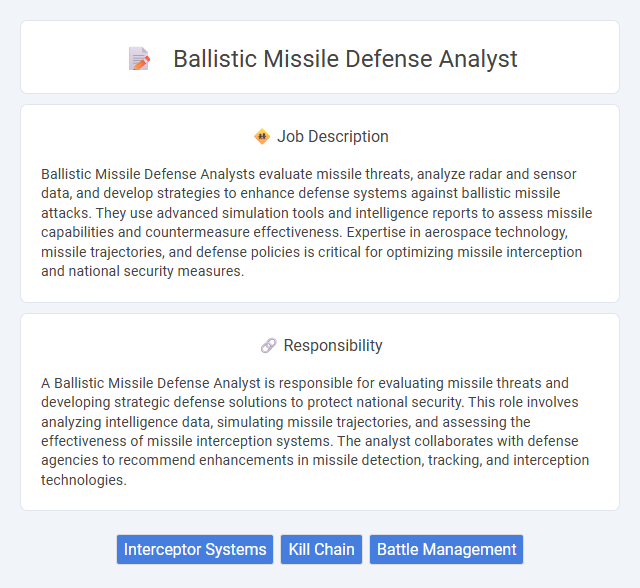
Ballistic Missile Defense Analysts evaluate missile threats, analyze radar and sensor data, and develop strategies to enhance defense systems against ballistic missile attacks. They use advanced simulation tools and intelligence reports to assess missile capabilities and countermeasure effectiveness. Expertise in aerospace technology, missile trajectories, and defense policies is critical for optimizing missile interception and national security measures.
Individuals with strong analytical skills and a keen interest in aerospace and defense technology will likely find the role of a Ballistic Missile Defense Analyst suitable. Those who are comfortable working in high-pressure environments and handling complex data sets may have a higher probability of succeeding in this position. However, candidates who struggle with attention to detail or prefer less technical work might find this career challenging.
Qualification
A Ballistic Missile Defense Analyst must possess a strong background in aerospace engineering, physics, or a related technical field, often requiring a bachelor's degree or higher. Expertise in radar systems, missile technology, and threat assessment is essential, along with proficiency in data analysis software and simulation tools. Experience with defense systems, intelligence analysis, and knowledge of international missile capabilities enhances the candidate's effectiveness in threat detection and mitigation.
Responsibility
A Ballistic Missile Defense Analyst is responsible for evaluating missile threats and developing strategic defense solutions to protect national security. This role involves analyzing intelligence data, simulating missile trajectories, and assessing the effectiveness of missile interception systems. The analyst collaborates with defense agencies to recommend enhancements in missile detection, tracking, and interception technologies.
Benefit
A Ballistic Missile Defense Analyst likely gains access to advanced technological resources and cutting-edge defense systems, enhancing their technical expertise. The role may offer competitive compensation and opportunities for career advancement within defense and national security sectors. There is a probable chance to contribute significantly to national safety, providing a strong sense of professional purpose and impact.
Challenge
The Ballistic Missile Defense Analyst role likely involves complex threat assessments and real-time data interpretation to anticipate missile trajectories and impact probabilities. This position may challenge an analyst to integrate multi-source intelligence while maintaining high accuracy under pressure. Managing evolving missile technologies and countermeasures probably demands continuous learning and adaptive analytical strategies.
Career Advancement
A Ballistic Missile Defense Analyst plays a crucial role in assessing missile threats, evaluating defense systems, and developing strategic countermeasures. Advancing in this career often involves gaining expertise in systems engineering, cyber defense, and policy analysis, with opportunities to specialize in areas like radar technology or warhead interception techniques. Progression can lead to senior analyst positions, project leadership roles, or strategic advisory capacities within defense agencies, defense contractors, and government intelligence organizations.
Key Terms
Interceptor Systems
A Ballistic Missile Defense Analyst specializing in Interceptor Systems evaluates the performance, effectiveness, and technological advancements of missile interceptors used to neutralize ballistic threats. This role involves analyzing radar data, simulation results, and threat intelligence to optimize interceptor deployment strategies and improve engagement accuracy. Expertise in missile guidance technologies, countermeasure identification, and system integration is critical for enhancing national defense capabilities against evolving missile threats.
Kill Chain
A Ballistic Missile Defense Analyst specializes in evaluating and optimizing the kill chain to enhance missile intercept capabilities. This role involves analyzing detection, tracking, target discrimination, and engagement phases to ensure timely and accurate threat neutralization. Expertise in sensor networks, radar systems, and interceptors is crucial for improving the kill chain's effectiveness against ballistic missile threats.
Battle Management
A Ballistic Missile Defense Analyst specializing in Battle Management evaluates and optimizes missile threat detection, tracking, and interception strategies. Expertise in real-time data integration from diverse radar and sensor networks is critical for enhancing situational awareness and decision-making. Proficiency in command and control systems supports seamless coordination between defense assets to effectively neutralize ballistic missile threats.
 kuljobs.com
kuljobs.com